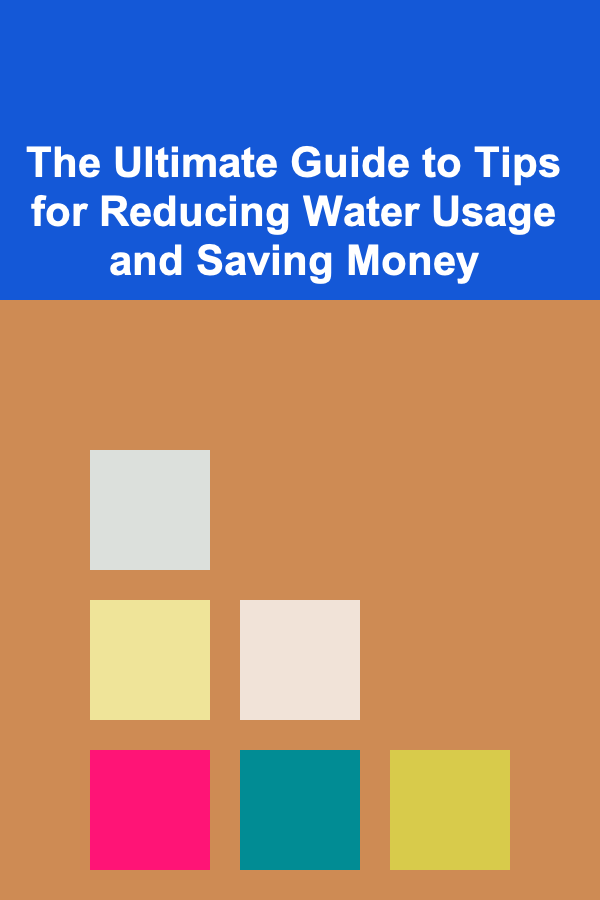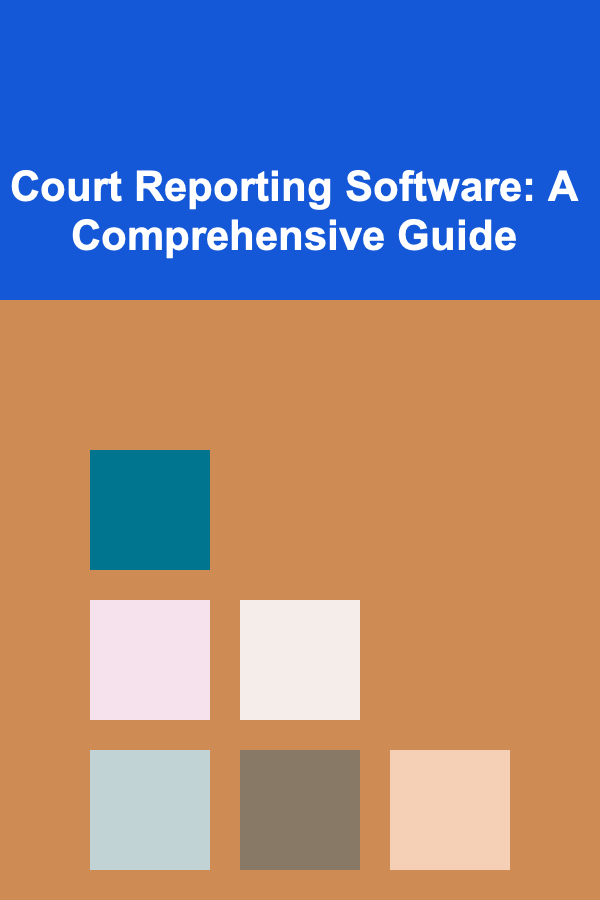
The Ultimate Guide to Tips for Reducing Water Usage and Saving Money
ebook include PDF & Audio bundle (Micro Guide)
$12.99$5.99
Limited Time Offer! Order within the next:

Water is an essential resource, but it's often taken for granted. Rising water costs, increased awareness of environmental issues, and the growing need to preserve our natural resources make it more important than ever to adopt water-saving practices. Reducing water usage not only lowers your utility bills but also helps conserve this precious resource for future generations. This guide will explore actionable tips that can significantly reduce your water usage and save you money over time.
Understanding the Importance of Water Conservation
Water conservation is a critical issue due to global water scarcity, environmental impacts, and the growing demand for clean water. According to the Environmental Protection Agency (EPA), the average American household uses over 300 gallons of water per day. Of this, nearly 70% is used indoors, primarily for activities like showering, flushing toilets, and washing clothes.
By using water more efficiently, we can make a positive impact on both our finances and the planet. Here are several practical, actionable tips to help you cut down on water waste and save money.
Install Water-Efficient Fixtures
One of the most straightforward ways to reduce your water consumption is by installing water-efficient fixtures in your home. These fixtures are designed to reduce the amount of water used without sacrificing performance.
Why It Works:
Water-efficient fixtures use advanced technology to minimize water flow while maintaining effectiveness. For example, low-flow showerheads, faucets, and toilets use significantly less water than traditional models.
Actionable Tip:
- Low-Flow Showerheads: Replace your current showerhead with a low-flow version that uses less water per minute. Many low-flow models use as little as 1.5-2 gallons per minute, compared to the 2.5-3 gallons used by traditional showerheads.
- Water-Efficient Toilets: Consider installing a dual-flush toilet that allows you to choose between a low-water or full-flush option depending on the situation.
- Faucets and Aerators: Install aerators on your faucets to reduce water flow without sacrificing water pressure.
Fix Leaks Promptly
Leaky faucets, toilets, and pipes are common culprits when it comes to wasting water. A slow drip from a faucet can waste hundreds of gallons of water per year, and a running toilet can waste even more.
Why It Works:
Addressing leaks quickly ensures that you're not wasting water unnecessarily. Even minor leaks can lead to large amounts of water loss over time, increasing your utility bills.
Actionable Tip:
- Regularly check faucets, pipes, and toilets for signs of leaks.
- If you have a leaky faucet, replace the washer or cartridge. If your toilet is running, the flapper may need to be replaced.
- For more significant plumbing issues, it's advisable to contact a professional plumber to prevent long-term damage and water loss.
Practice Efficient Watering in the Garden
Watering your lawn and garden can account for a significant portion of your water bill, especially during the summer months. However, many people overwater their plants, leading to wasteful water usage.
Why It Works:
Watering your plants efficiently helps minimize waste while ensuring they stay healthy. By optimizing your watering practices, you can conserve water and reduce costs.
Actionable Tip:
- Water Early or Late: Water your garden in the early morning or late evening to reduce evaporation. Watering in the heat of the day can cause water to evaporate before it reaches the roots.
- Use Drip Irrigation: Switch to drip irrigation systems that deliver water directly to the roots, reducing evaporation and runoff.
- Rain Barrels: Collect rainwater in barrels to use for watering your garden. Rainwater is free, and using it reduces your reliance on municipal water.
Take Shorter Showers and Avoid Baths
Taking long, hot showers or filling up the bathtub can be a major source of water waste. Showers and baths use large amounts of water, and if you're not mindful of the time you spend in them, your water usage can skyrocket.
Why It Works:
Cutting down on shower time can lead to significant water savings. A 10-minute shower with a standard showerhead uses about 25 gallons of water, while a full bath can use up to 70 gallons.
Actionable Tip:
- Set a Timer: Challenge yourself to take shorter showers by setting a timer for 5 minutes.
- Install a Water-Saving Showerhead: As mentioned earlier, low-flow showerheads are an easy way to reduce water use without sacrificing the quality of your shower.
- Take Showers Instead of Baths: Showers generally use less water than baths, so choose a shower over a bath whenever possible.
Wash Full Loads of Laundry and Dishes
Washing dishes or doing laundry with a half-full load is inefficient and wastes both water and energy. To make the most of each washing session, always aim to wash full loads when using the dishwasher or washing machine.
Why It Works:
When you wash a full load, the appliance uses the same amount of water and energy as it would for a smaller load, making it a much more efficient option.
Actionable Tip:
- Dishwasher: Only run your dishwasher when it's fully loaded, and choose energy-efficient cycles when available. If you wash dishes by hand, try to use a basin or fill the sink with water instead of leaving the faucet running.
- Washing Machine: Wait until you have a full load of laundry before running the washing machine. Many modern washers also have water-saving settings, so utilize these when possible.
Use a Pool Cover
If you have a swimming pool, you may not realize how much water you're losing to evaporation. Without a cover, pools can lose several inches of water per week, especially in hot weather.
Why It Works:
A pool cover helps reduce water loss due to evaporation, keeping your pool full and reducing the need for frequent refilling.
Actionable Tip:
- Invest in a pool cover and use it whenever your pool is not in use. This will help reduce the need for refills and save you money on your water bill.
Adopt Smart Watering Practices
If you live in an area with water restrictions or want to optimize your garden care, adopting smart watering practices can make a big difference in reducing water usage.
Why It Works:
Watering more efficiently ensures that your plants get the moisture they need without wasting water.
Actionable Tip:
- Group Plants by Watering Needs: Arrange your garden so that plants with similar water needs are grouped together. This ensures you're not over-watering plants that need less water.
- Use Mulch: Mulch helps retain moisture in the soil, reducing the need for frequent watering.
Consider Water-Efficient Appliances
Modern dishwashers, washing machines, and other household appliances are designed to be more water-efficient than older models. If your appliances are outdated, it may be worth considering an upgrade.
Why It Works:
Water-efficient appliances use less water per cycle while providing the same level of cleaning. Over time, this leads to reduced water consumption and lower utility bills.
Actionable Tip:
- When it's time to replace an old appliance, look for energy- and water-efficient models. Energy Star-rated appliances are designed to meet strict energy and water-saving criteria.
Educate Your Family or Housemates
Sometimes, the best way to save water is through education. Make sure everyone in your household is aware of the importance of water conservation and knows how to implement water-saving habits.
Why It Works:
Everyone's efforts combined can lead to substantial water savings. Simple habits like turning off the tap while brushing your teeth or taking shorter showers can add up over time.
Actionable Tip:
- Hold regular discussions with your household members about ways to save water. Encourage them to adopt practices like turning off taps when not in use, using a dishwasher only with full loads, and taking quick showers.
Conclusion
Reducing your water usage doesn't require drastic changes or expensive upgrades. By incorporating small, sustainable practices into your daily routine, you can significantly lower your water consumption and save money on your utility bills. Start with simple changes like fixing leaks, using water-efficient appliances, and optimizing your watering practices, and gradually build on these habits.
Conserving water is not only a financially wise decision but also a step towards more sustainable living. By becoming more mindful of how we use water, we can all contribute to preserving this vital resource for future generations.
Reading More From Our Other Websites
- [Mindful Eating Tip 101] From Plate to Presence: How to Turn Every Meal Into a Meditation
- [Home Renovating 101] How to Update Your Bathroom for a Fresh Look
- [Personal Financial Planning 101] How to Plan for Retirement When You're in Your 20s or 30s
- [Screen Printing Tip 101] Troubleshooting Common Issues in Screen Printing on Paper and How to Fix Them
- [Home Lighting 101] How to Light a Stairwell for Safety and Style
- [Horseback Riding Tip 101] Maintaining Your Riding Equipment: Tips for Longevity and Performance
- [Personal Care Tips 101] How to Choose the Best Eye Cream for a Smoother Under-Eye Area
- [Organization Tip 101] How to Organize Your Kids' Clothing for Quick Dressing
- [Home Soundproofing 101] How to Soundproof a Home Music Studio for Optimal Sound Quality
- [Personal Care Tips 101] How to Treat Acne-Prone Skin with Personal Care Tips

Building Stronger Communities Together: Insights from a Successful Community Outreach Coordinator
Read More
How to Make a Checklist for Environmental Safety Inspections: An Actionable Guide
Read More
How to Organize Art Supplies and Toys Together
Read More
How to Sell Your Antique Coins on eBay: A Comprehensive Guide
Read More
How to Streamline Your Morning Routine with Organization
Read More
Court Reporting Software: A Comprehensive Guide
Read MoreOther Products

Building Stronger Communities Together: Insights from a Successful Community Outreach Coordinator
Read More
How to Make a Checklist for Environmental Safety Inspections: An Actionable Guide
Read More
How to Organize Art Supplies and Toys Together
Read More
How to Sell Your Antique Coins on eBay: A Comprehensive Guide
Read More
How to Streamline Your Morning Routine with Organization
Read More